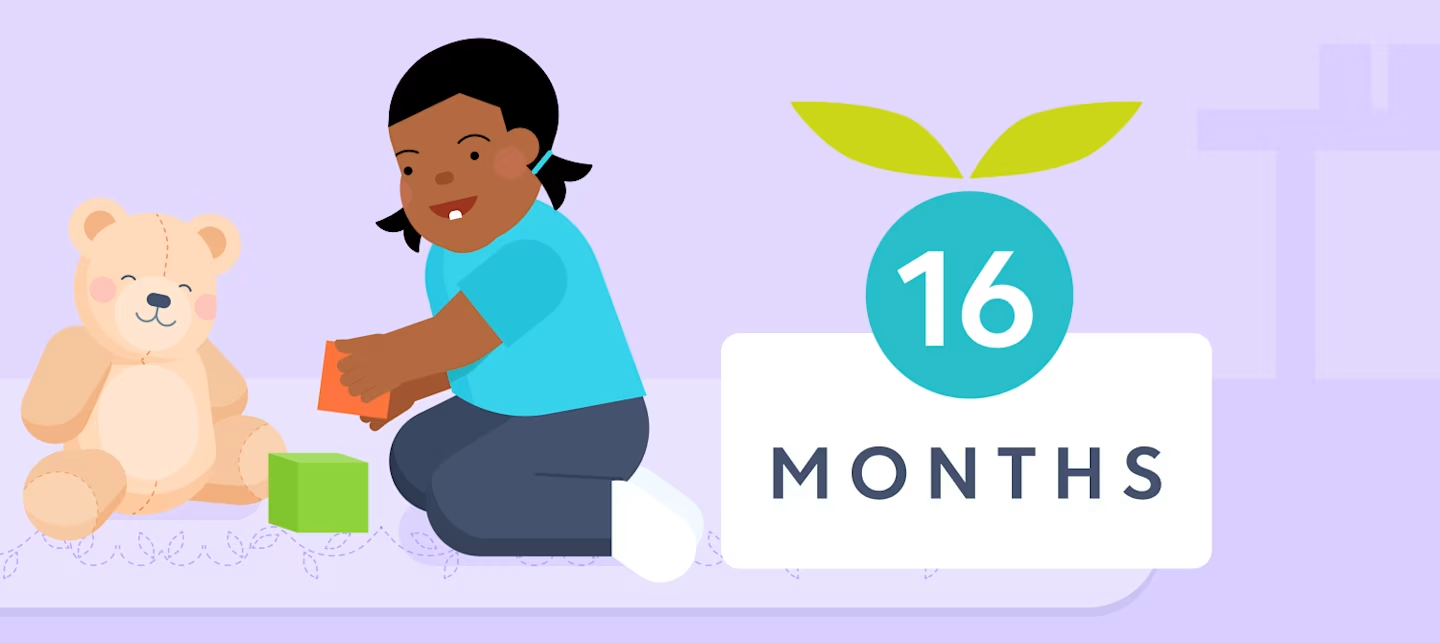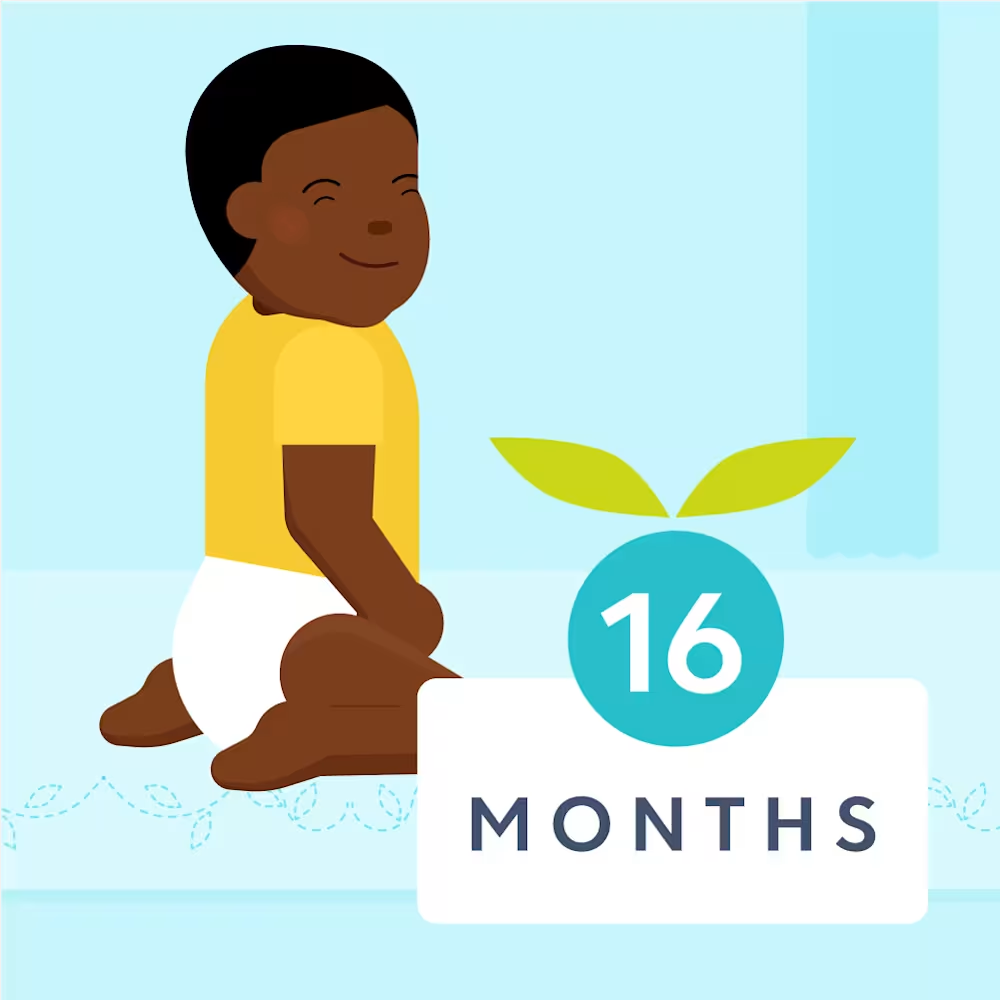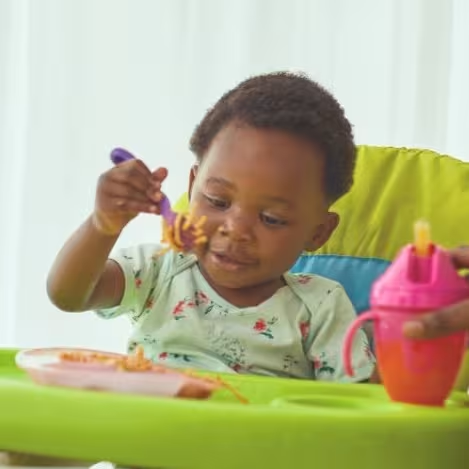16 month old toddler milestones: Development, growth, speech, language
Updated Jan 26, 2026

At 16 months, toddlers are working on skills like walking and talking. They are likely walking well now and can say a few words spontaneously. Children seem to learn and grow every day at this age — they’ll likely be able to say around 20 words [] in the next few months. Make sure to have your camera ready to capture all of these adorable milestones!
In this article, we’ll take you through the milestones you can expect from 16 - 17 months, give you a handy 16 month old development checklist, and provide useful tips to help ensure your little one is learning and growing as much as possible.
16 month old milestones at a glance
Development:
Your toddler may be steadier on two legs now as they gain coordination and muscle strength from walking practice. The next gross motor milestones they’ll likely work on include walking backward and taking steps up stairs with assistance. Don’t fret if your child isn’t there yet at 16 months, however. There’s a when it comes to walking — your little one might have taken their first steps as early as 10 months or perhaps they’re still working on walking independently.
Children around this age are also likely to say a few words. 16 month old speech milestones include skills like being able to follow simple instructions and combining sounds and actions. For example, pointing to a dog and saying “da.” Remember, approximations like “da” for “dog” count as words too!
Sleep:
At 16 months, we recommend around of total sleep per day for most children. This includes at least 11 hours of sleep at night and 2 - 3 hours of daytime sleep, split over one or two naps. Note that every child is unique and sleep needs vary. Pay attention to your little one’s mood and energy levels when evaluating if they’re getting enough rest.
It’s common for children to transition to a between 14 - 18 months, so your toddler may be taking one or two naps at this age. If they’re napping once per day now, their morning wake window is likely around 5 hours both before and after their nap. If your child is still taking two naps each day, they likely have around 3.25 hours of awake time before their morning nap and around 3.5 hours before their second nap.
At this age, sleep can be disrupted by the emergence of pesky molars. Because of their size and the additional time they take to come through the gums, this round of teething may be more painful for children than usual. Don’t be surprised if your little one wants more comfort around this time, especially at night. There are a variety of ways to ease pain before bedtime, such as letting your kiddo chomp on a cold washcloth and gum massage.
If you’d like personalized sleep guidance for your little one, especially as you navigate the change to a 1-nap schedule, consider submitting for a sleep plan through . Our step-by-step plans are tailored to your child’s needs as well as your family’s goals.
Feeding:
Your toddler will likely eat roughly per day at 16 months. At this age, they’re starting to depend on solid foods to get the nutrition they need to grow. At the same time, don’t be surprised if your child goes through a phase at this point. It’s normal! Although frustrating, picky eating and mealtime power struggles are very common. Rest assured that this is typically a phase that your kiddo will grow out of. In the meantime, trust that your little one will eat when they’re ready and avoid becoming a short-order cook as much as possible, which can reinforce picky eating.
Try to diffuse power struggles at the dinner table by telling your toddler, “You don’t have to eat it if you don’t want to.” The around eating can also help. This is a practice that indicates your job as a parent/caregiver is to decide what is being served and how much while the child then decides if they will eat it and how much.
16 month olds can also practice fine motor skills at the table by trying to use utensils and drink from cups. It may still be messy at this age, but it’s a good habit to promote for the future. Modeling how to use these items for your child can be helpful, along with lots of positive encouragement when they try, too!
Growth:
Over your child’s second year of life, growth generally slows down from the rapid pace of their first year. You may expect your toddler to have a weight gain [] of about 5 pounds (2.3 kg) over the course of the year. They may grow about 4 - 5 inches (10 – 13 cm) in height.
Note that it can be normal for your little one to grow more or less than this between 16 - 17 months. At well-child visits, your child’s doctor will chart their height and weight to check that they’re growing at a regular pace and can pinpoint any trends that need attention. If you have concerns about your toddler at 16 months, consult their pediatrician.
In addition to growth, you’ll likely notice that your toddler’s body proportions are beginning to change. They probably don’t look so much like a baby anymore! Children usually start to become more muscular at this age because of their increased activity.
16 month old developmental milestones
Physical development
Gross motor milestones
Walking well: Most 16 month olds are walking independently. They may be growing out of the (called “toddling”) as they get better at taking steps alone and don’t need to use their arms as much to stay balanced on two legs. However, there’s a wide range of normal when it comes to walking and some children may need more time or help to reach 16 month gross motor milestones. Let your child’s doctor know if they are not taking a few steps by 15 months [].
New walking skills: After your child learns to walk, they’ll continue adding more skills. For instance, kiddos may be able to walk backward and walk up steps with assistance between 16 - 18 months []. By about 18 months [], children can usually pull toys while walking too.
Fine motor milestones
Scribbling: You may have a budding artist on your hands thanks to 16 month fine motor milestones! Between 15 - 17 months, most children are able to scribble spontaneously [], meaning without needing to watch someone do it first.
Two-block tower: Between 15 - 17 months [], children usually have the fine motor skills and hand-eye coordination needed to build a two-block tower. Then between 18 - 23 months [], this skill progresses and kids generally have the fine motor skills to make four- or six-block towers!
Speech development
Talking: 16 month old speech development usually means your little one is adding to their vocabulary. Most 15 month olds are able to say a few words [] and your toddler will likely continue spontaneously saying more words in the coming months. By 18 months, children can usually say around 20 words [].
Following instructions: Between 14 - 16 months is when you may expect your toddler to start understanding and following simple commands []. For example, “Give me the ball.”
Two-word phrases: Your little one may be able to put two-word phrases together at 16 months, however, this is on the early side of the milestone. These first “sentences” usually happen between 16 - 24 months []. There’s a wide range of normal for this language development, so don’t worry if your 16 month old isn’t there yet. Let your child’s doctor know if they aren’t using two words together by 24 months.
Combining sounds and actions: Being able to communicate with sounds and actions [] is an exciting development at around 16 months. This may look like your little one pointing to an object and saying its name. At this age, it can be a little easier to understand your toddler’s desires when they are able to combine gestures and words.
Social development
Emotional development
Separation anxiety: Typical 16 month old emotional development means it’s likely your child will experience some . The American Academy of Pediatrics [] indicates that many toddlers exhibit separation anxiety around 15 or 18 months. It may increase or decrease as your child has moved from crawling to walking, but this depends on your child and their temperament. Hunger, tiredness, and illness can make children even more aware of separations.
Routines: At 16 months your child may look to routines and transitions [] to feel safe and confident, as well as more in control of their little world. Try to keep daily routines the same for toddlers and talk through when a transition is coming to help your child prepare and cope with change.
Tantrums: 16 month olds tend to have lots of big feelings and can become very frustrated when they aren’t in control or can’t clearly communicate their wants and needs. This inevitably leads to tantrums. Temper tantrums are part of normal . Try to remain calm if your child has a meltdown and resist the urge to give in, as this can backfire and lead to more tantrums if they learn this is an effective tactic to get their way.
16 month old development milestones checklist
Keep in mind all toddlers are unique and don’t learn and grow all at the same time. There’s often a wide spectrum of normal milestones at 16 months. However, if you are concerned about your child’s growth or developmental delays, reach out to their healthcare provider.
Walks well
May walk backwards
May walk upstairs with assistance
Tries to use utensils and drink from a cup
Scribbles spontaneously
Builds a two-block tower (15 - 17 months)
Can say a few words or more
Understands and follows simple instructions
May begin to use two-word phrases (16 - 24 months)
Combines sounds and actions (points to water and says “wawa”)
What are 16 month old development red flags?
It's OK if your little one hasn't reached every 16 month milestone — there's a spectrum when it comes to physical growth and development. However, there are some instances where checking in with your child's healthcare provider is advisable []:
Doesn’t crawl
Isn't able to stand, even when supported
Doesn’t search for things you hide while they watch
Not pointing to objects, waving bye-bye, or shaking head “no”
Does not say single words such as “mama” or “dada"
Child loses skills they once had
Always feel free to reach out to your child's healthcare provider if you have any questions or concerns — it's often best to err on the side of caution.
3 development tips for 16 month olds
Tip | Why it helps | What to try |
|---|---|---|
Encourage age-appropriate problem-solving | Trying tasks independently builds confidence, reduces power struggles, and supports motor development. | Let your toddler try before you lend a hand. Offer help only after they’ve had a chance to practice. |
Brush your child’s teeth | Early dental routines support long-term oral health and help toddlers learn daily self-care habits. | Use a small toothbrush with a rice-sized smear of toothpaste, and make brushing part of the bedtime routine, especially as molars come in. |
Support your toddler’s efforts | Praising effort (not just results) encourages persistence, resilience, and confidence in new skills. | Acknowledge hard work: “You’re trying so hard to stack those blocks!” This helps toddlers stay motivated even when tasks are challenging. |
Find more details below:
Tip #1: Encourage age-appropriate problem solving
At 16 months, of course, your child will still need help doing most things. However, toddlers often try to assert their independence at this age and want to do things on their own. Letting them try first can be helpful in avoiding power struggles. For example, let your kiddo try to put on their shoes for a minute before stepping in to complete the task. This requires extra time and patience on your end, but it’s good practice for future skills development and building confidence.
Tip #2: Brush your child’s teeth
Now is the time to start good dental hygiene habits with your toddler. Consider adding teeth brushing to their bedtime routine if you haven’t done so already, especially after their molars come through. Use a small toothbrush and a small bit of toothpaste (about the size of a grain of rice).
Tip #3: Support your toddler’s efforts
A good way to support your child is by offering praise for their efforts [], not just the outcome of their efforts. For example, if they’re trying to build a small tower of blocks but it falls over every time, help your child feel good about working so hard to get it right. This encourages them to be persistent and helps teach them the importance of continuing to try.
Activities for a 16 month old toddler
1. Listen and repeat
To promote 16 month old speech development, try repeating the words your child says back to them. For example, if your little one says “ba” and points to a ball, say something like, “Yes, there’s a ball” back to them. Repetition leads to little ones learning more words and is also an important part of language comprehension.
2. Practice walking skills
As your little one becomes a more confident walker, try making this new gross motor skill fun. You can try activities like marching to music, taking big and small steps, and walking fast and slow as your toddler’s strength and muscle coordination [] increase. These simple games are also great for improving listening skills and language comprehension.
Caring for a sick child at 16 months
It's so hard when your toddler is under the weather! Often children have trouble sleeping and maintaining their usual energy levels when they're sick. Keep these tips in mind to help them feel better (during sleep times and beyond).
Keep them hydrated: Fluids are especially important when your little one is under the weather. Solid foods can also contribute to hydration, but if they’re not interested in eating, focus on offering frequent small sips of age-appropriate liquids (e.g. water, milk) instead.
Ease congestion: A stuffy nose can make eating and sleeping harder. Use a cool-mist humidifier, saline drops, and gentle suction to clear nasal passages, especially before naps and bedtime.
Monitor fevers: Call your pediatrician if your toddler’s fever lasts more than 24 hours or repeatedly goes above 104°F (40°C) []. If approved by their doctor, you may give infant or children’s Tylenol or Motrin. Avoid cough and cold medicines, which are not safe for young children.
Be flexible with sleep: When your toddler is sick, they may nap more, nap less, or wake more during the night. Follow their lead for now and return to your regular schedule once they’re well.
Offer extra comfort: Some toddlers want extra snuggles when they’re sick, while others prefer a bit of space. Watch their cues and respond in ways that help them feel comforted and safe. Taking care of a sick toddler can be exhausting for parents too. Lean on your support network when possible.
Takeaway: Development milestones for 16 month olds
16 month olds are learning and growing every day, especially since most children are walking well at this age and can explore their environment more easily.
When it comes to 16 month old language development, your kiddo is likely spontaneously saying a few words. How exciting! They may even be able to point to an object and say its name.
16 month olds are likely trying to exert their independence in many facets of life. This can look like picky eating, throwing temper tantrums when frustrated, and preferring to try to do things themselves, even if they really can’t. While this behavior can be time-consuming and frustrating, take comfort in knowing the toddler stage won’t last forever!
Keep in mind there’s a wide range of normal for toddler growth and development at 16 months. While children typically do most of these things around 16 - 17 months, it’s OK if your little one isn’t quite there yet. That said, consult with your child’s healthcare provider if you notice any developmental red flags or delays.
Share article:
Note: The content on this site is for informational purposes only and should not replace medical advice from your doctor, pediatrician, or medical professional. If you have questions or concerns, you should contact a medical professional.
12 Sources
Share article:







